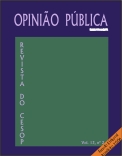Resumo
O artigo mostra o impacto dos escândalos de corrupção sobre o voto do eleitor brasileiro na eleição presidencial de 2006. A pergunta central é se aqueles que consideraram a corrupção como principal problema deixaram de votar em Lula. O artigo avalia se e como os componentes retrospectivo, ideológico e partidário influem no voto bem como o impacto de fenômenos circunstanciais sobre ele. Os dados mostram que as percepções sobre a corrupção têm um peso maior na escolha de candidatos de partidos políticos vizinhos no espectro ideológico brasileiro e peso menor na escolha de candidatos de coalizões partidárias muito distantes neste espectro. Assim, na escolha de voto entre Lula e Alckmin, fatores como percepções sobre a economia, avaliação do governo Lula e certo componente partidário foram mais importantes e serviram de escudos para proteger Lula das acusações de corrupção no cenário da reeleição.
Abstract
The article shows the impact of corruption scandals on the Brazilian voter’s choice in the 2006 Presidential election and it analyses if those individuals who have considered corruption the main Brazilian problem also did not vote for Lula. The article evaluates if and how the retrospective, ideological and partisan elements have influence on voting, as well as the circumstantial phenomena. Data shows that perceptions about corruption have more impact on the choice for candidates of political parties ideologically neighbors and have less impact on the choice for candidates of ideologically distant political parties. Therefore, the voter’s perceptions about economy, the Lula’s government performance and some partisan aspect were more important for the choice for President and have protected the candidate from the corruption’s accusations.
Key-words: Corruption; retrospective voting; democratic accountability; 2006 Presidential election
Referências
ALMEIDA, A. “A Esquerda dos Números à Direita dos Fatos.” Insight Inteligencia, vol.15, p.112-128, 2001.
AMES, B.; BAKER, A.; MOCHEL, M. and RENNÓ, L. “Party Identification in Third Wave Democracies: Brazil’s 2002 Elections.” Prepared for delivery in the 2006 meeting of the Midwest Political Science Association, Chicago, 20-23 Apr., 2006.
CAMPBELL, A. et al. The American Voter. New York: Wiley Publishing, 1960.
CARREIRÃO, Y. A Decisão de Voto nas Eleições Presidenciais Brasileiras. Rio de Janeiro: Editora da FGV, 2002.
CARREIRÃO, Y. 2007. “Relevant Factors for the Voting Decision in the 2002 Presidential Elections: An Analysis of the ESEB (Brazilian Electoral Studies) Data”. Brazilian Political Science Review, vol.1, nº.1, p.70:101, 2007.
CARREIRÃO, Y. e BARBETTA, P. A. “A Eleição Presidencial de 2002: A Decisão de Voto na Região da Grande São Paulo.” Revista Brasileira de Ciências Sociais, vol.19, nº.56, p.56-79, 2004.
CARREIRÃO, Y. e KINZO, M. D. “Partidos Políticos, Preferência Partidária e Decisão Eleitoral no Brasil (1989/2002).” Dados, vol.47, nº.1, p.31-167, 2004.
CONVERSE, P. The Concept of the Normal Vote. In: CAMPBELL et al., Elections and the Political Order. New York: Wiley, 1966.
DELLI CARPINI, M. X. and KEETER, S. What Americans Know About Politics And Why It Matters. New Haven: Yale University Press, 1996.
FELDMAN, S. e ZALLER, J. “The Political Culture of Ambivalence: Ideological Responses to the Welfare State.” American Journal of Political Science, vol.36, p.268-307, 1992.
FIORINA, M. Retrospective Voting in American National Elections. New Haven: Yale University Press, 1981.
GREEN, D. and PALMQUIST, B. “How stable is party identification?” Political Behavior, vol.16, p.437-466, 1994.
HOLBROOK, T. “Campaigns, National Conditions, and U.S. Presidential Elections.” American Journal of Political Science, vol.38, p.973-98, 1994.
KINDER, R. e KIEWIT, D. “Sociotropic Politics: The American Case.” British Journal of Political Science, vol.11, p.129-61, 1981.
KING, G., KEOHANE, R. O., VERBA, S. Designing Social Inquiry: Scientific Inference in Quantitative Research. Princeton: Princeton University Press, 1994.
LUPIA, A. “Shortcuts Versus Encyclopedias: Information and Voting Behavior in California Insurance Reform Elections.” American Political Science Review, vol.88, nº.1, p.63-76, 1994.
LUSKIN, R. From Denial to Extenuation (and Finally Beyond): Political Sophistication and Citizen Peformance. In: KUKLINSKI, J. (ed.). Thinking About Political Psychology. Cambridge: Cambridge University Press, 2002.
MAINWARING, S. P. and SCULLY, T. (eds.). Building Democratic Institutions: Party Systems in Latin America. Stanford: Stanford University Press, 1995.
MENEGUELLO, R. Partidos e Tendências de Comportamento: O Cenário Político em 1994. In: DAGNINO, E. (ed.). Os Anos 90: política e sociedade no Brasil. São Paulo: Brasiliense, p.151- 171, 1994.
NICOLAU, J. “An Analysis of the 2002 Presidential Election using Logistic Regression.” Brazilian Political Science Review, vol.1, nº.1, p.125-135, 2007.
O’DONNELL, G. “Delegative Democracy”. Working Paper Series, The Helen Kellogg Institute for International Studies, 1994.
PAPPI, F. U. “Political Behavior: Reasoning Voters and Multi-party Systems.” In: GOODIN, R. and KLINGEMANN, H. (eds.). A New Handbook of Political Science. Oxford: Oxford University Press, p.255-275, 1996.
PEREZ-LIÑAN, A. Presidential Impeachment and the New Political Instability in Latin America. Cambridge: Cambridge University Press, 2007.
PITKIN, H. The Concept of Representation. Berkeley: University of California Press, 1967.
PRZEWORSKI, A., STOKES, S. and MANIN, B. Democracy, Accountability, and Representation. Cambridge: Cambridge University Press, 1999.
RENNÓ, L. “Notes on the 2006 Brazilian Presidential Elections: The Winding Road to Democratic Consolidation.” Colombia Internacional, vol.64, p.154-165, 2006.
RENNÓ, L. e SPANAKOS, A. “Macroeconomia, Mercado Financeiro e Intenção de Voto para presidente: As Eleições Brasileiras de 1994, 1998 e 2002.” Dados-Revista De Ciências Sociais, vol.49, nº.1, 2006.
SAMUELS, D. “Sources of Mass Partisanship in Brazil.” Latin American Politics and Society, vol.48, nº.2, p.1-27, 2006.
SINGER, A. Esquerda e Direita no Eleitorado Brasileiro: A Identificação Ideológica nas Disputas Presidenciais de 1989 e 1994. São Paulo: Edusp, 1999.
SNIDERMAN, P. “Taking Sides: A Fixed Choice Theory of Political Reasoning.” In: LUPIA, A., MCCUBBINS, M. and POPKIN, S. (eds.). Elements of Reason: Cognition, Choice, and the Bounds of Rationality. Cambridge: Cambridge University Press, 2000.
STOKES, S. Public Support for Market Reforms in New Democracies. Cambridge: Cambridge University Press, 2001.
ZALLER, J. R. The Nature and Origins of Mass Opinion. Cambridge: Cambridge University Press, 1992.
A Opinião Pública utiliza a licença do Creative Commons (CC), preservando assim, a integridade dos artigos em ambiente de acesso aberto.

